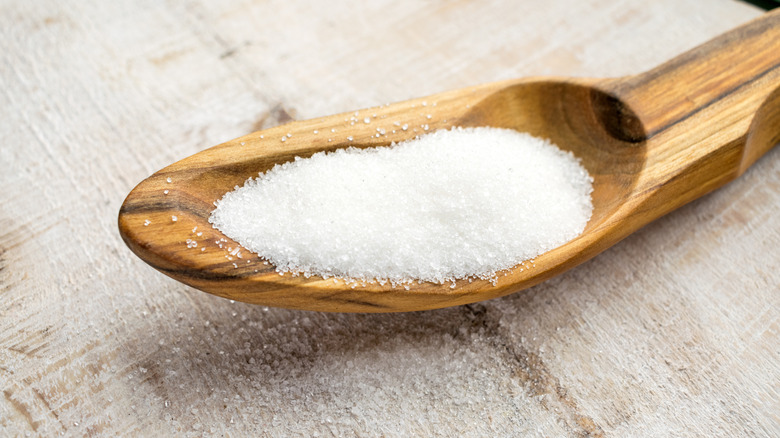This Popular Artificial Sweetener Could Permanently Change Your Body
Editor's note: A prior version stated that your body produces S6A after eating or drinking something with sucralose; however, the data reflected in the study haven't been peer-reviewed and is currently unpublished. This story has been updated to reflect this information.
You've probably heard way too often to reduce the amount of added sugar from your diet, and food manufacturers have given us many options to sweeten our foods and drinks with non-sugar substitutes. As you reach for the array of artificial sweeteners for your morning coffee, you might want to rethink the yellow packets. Sucralose, a popular sweetener, might disrupt your system once your body breaks it down. According to the study author of a 2023 article in the Journal of Toxicology and Environmental Health, Dr. Susan Schiffman, it's alleged that your gut produces sucralose-6-acetate (S6A) after eating or drinking something with sucralose. When the researchers exposed sucralose-6-acetate to human blood cells, it broke up the DNA, making sucralose-6-acetate a genotoxic substance.
The study also exposed human cells that line the gut to sucralose-6-acetate and found that it broke up the connections between the gut's lining. This made the gut's lining more permeable and could cause "leaky gut." The sucralose-6-acetate also increased the gene expression in the gut cells related to inflammation, oxidative stress, and cancer.
Sucralose-6-acetate found in sucralose products
Although sucralose-6-acetate is a byproduct of sucralose, the researchers also found traces of the genotoxic substance in the sucralose sold in grocery stores. The traces of sucralose-6-acetate found in a drink sweetened with sucralose exceeds the daily limit of genotoxic substances set by the European Food Safety Authority.
It's important to note that the makers of Splenda say that their products weren't specifically used in the study and that Splenda doesn't have sucralose-6-acetate in its yellow packets.
After reviewing more than 110 studies to look for toxicity, the Food & Drug Administration approved sucralose in 1998 as a food additive and a general sweetener in 1999. However, Susan Schiffman, corresponding author of the study and an adjunct professor in the joint department of biomedical engineering at North Carolina State University and the University of North Carolina at Chapel Hill, says that mounting research on sucralose shows it might not be as safe as it seems.
"It's time to revisit the safety and regulatory status of sucralose because the evidence is mounting that it carries significant risks," Schiffman said. "If nothing else, I encourage people to avoid products containing sucralose. It's something you should not be eating."
Is sucralose safe?
A 2017 article in Frontiers in Physiology found that sucralose changed the gut microbiota in mice. After adding sucralose to the mice's water for six months, the researchers found an increase in pro-inflammatory bacteria in their gut. A 2022 article in Frontiers in Nutrition also found the effect of sucralose on the gut microbiome. Sucralose reduced the healthy probiotics and increased pathogenic bacteria. The study also noted that sucralose affects the lining of the colon.
The World Health Organization recently recommended that people refrain from using non-sugar sweeteners because they don't do much to help people lose weight. The advisory also added that using artificial sweeteners can factor into your risk for type 2 diabetes, cardiovascular disease, and mortality. Rather than use these non-nutritive sweeteners in your foods and drinks, it's better to opt for foods naturally sweetened, such as fruit. A better option is to reduce the sweetness of foods and beverages overall.



